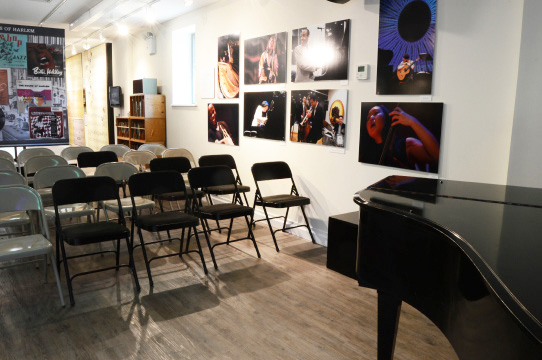Past Events
Desert Island Discs w/ Samora Pinderhughes
Join curator and host Ted Panken for an in-depth Desert Island Discs listening party with pianist and vocalist, Samora Pinderhughes.
At 32, Samora Pinderhughes is a pianist-vocalist-songwriter-composer-interdisciplinary artist-social activist – not necessarily in that order. He’s fulfilled all those roles in the course of undertaking the decade-long Healing Project, based on several hundred interviews, including intense conversations with incarcerated artists, which has generated numerous musical and video meditations on structural violence, among them the 15 songs on his acclaimed 2022 album GRIEF, one of which is “Keith LaMar: Sweet,” around which, in February, he dropped a short film of that title. Earlier this year, Going to Mars: the Nikki Giovanni Project, a nuanced, searingly honest documentary of the eminent poet for which Pinderhughes and Chris Pattishall composed the soundtrack, was Oscar-shortlisted. Aja Monet’s 2024 Grammy-nominated when the poems do what they do features Pinderhughes’ keyboard playing and arranging. And he’s collaborating on music for End the Exception, a campaign to excise the 13th Amendment loophole that allows slavery in the prison system.
Each of the aforementioned projects is a trans-genre endeavor. Pinderhughes views jazz as “more a lineage than a style.” He credited his immersive background in jazz-as-such, which he accessed to great effect on The Transformations Suite (2016), for providing him numerous tools by which to execute and actualize his vision. Born and raised in Berkeley, California, to parents with New York roots, Pinderhughes studied closely with Kenny Barron, Frank Kimbrough and Kendall Briggs at Juilliard School of Music, where he matriculated on full scholarship as a jazz piano student.
He says: “The artists I heard growing up who I most respect – Max Roach, Mingus, Ellington and Strayhorn, Nina Simone, Mary Lou Williams, Harry Belafonte, June Jordan, Gil Scott-Heron – always pushed boundaries thematically, sonically, in every way. I try to extend what I consider its core tenets as a way of living, music or non-music – engaging with composition in a way that’s also informed by improvisation; deep listening and understanding how to sublimate the ego; embodying community in the act of improvisation by having a direct conversation with an audience, and the people you’re playing with, to express exactly what you want to in that moment.”
A Harlem resident, Pinderhughes comes to NJMH for a special edition of Desert Island Discs, playing tracks he’d want for company on the proverbial desert island, and discussing them with host Ted Panken.
DESERT ISLAND DISCS: In the fall of 2015, the National Jazz Museum in Harlem debuted its version of Desert Island Discs. It’s modeled on an iconic BBC radio show, extant since 1942, which invites eminences from various walks of life to choose—and discuss—the eight records they would bring for a stay on the apocryphal desert island. For the Jazz Museum’s expanded version curated and hosted by esteemed journalist Ted Panken, the presenters are jazz musicians, who will present a cohort of music, of any genre, that was essential in the formation and evolution of their musical personality.
Desert Island Discs w/ Samora Pinderhughes

National Jazz Museum in Harlem

